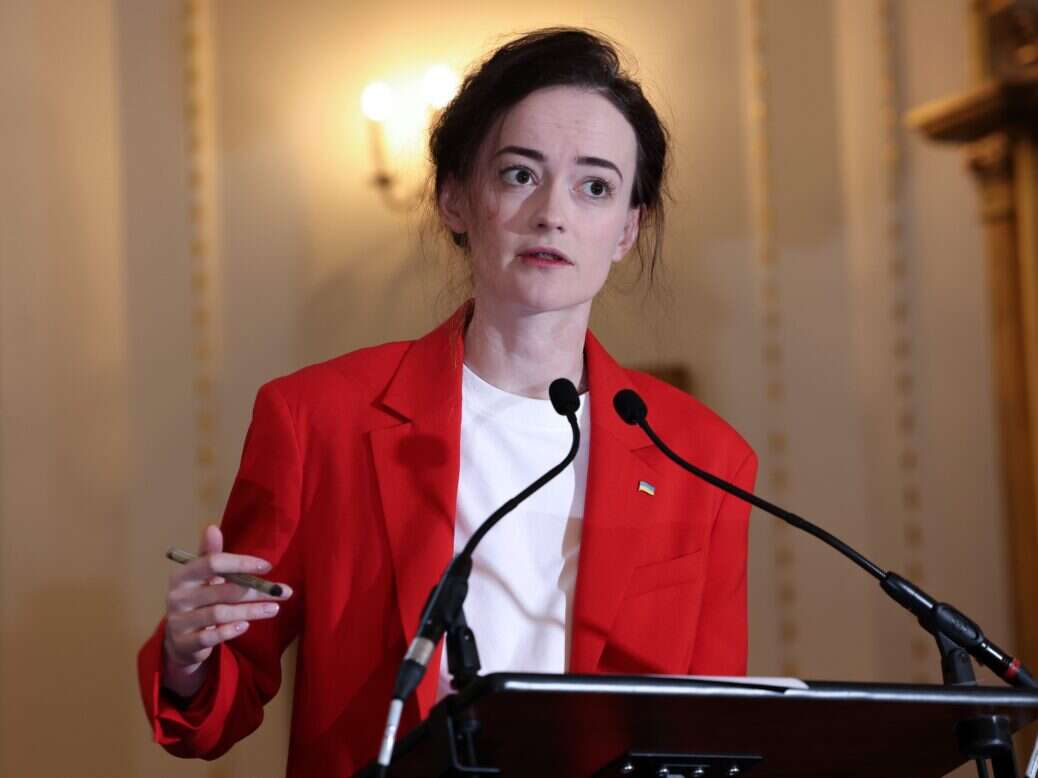
Kyiv Independent editor-in-chief Olga Rudenko has condemned Elon Musk, thanked the Daily Mail and urged UK journalists to lead the public interest by continuing to cover Ukraine.
Olga Rudenko was delivering the annual Hugh Cudlipp lecture at Stationers’ Hall in London on Wednesday night, organised by the Mirror and London Press Club in memory of the Daily Mirror’s famous editorial director.
Rudenko explained how the Kyiv Independent was born 18 months ago when the entire staff of English language weekly the Kyiv Post were fired by the owner – apparently due to their critical coverage of the government.
“The owner decided to take things under his own control and fired the entire team. He tried to reboot the Kyiv Post as a PR newspaper publishing puff pieces about the government and winning him friends and influence.”
Rudenko said the 30 journalists were all offered jobs in other media but decided to start their own title in a Ukraine media landscape which she said was “quasi-free” and dominated by oligarchs keen to win favour with the ruling regime.
She was advised by one senior Ukrainian journalist, she said, to go back and make peace with the owner of the Kyiv Post: “We were young enough and angry enough to refuse to accept that.” At 34, Rudenko is the oldest member of the Kyiv Independent team.
The title began life within days as an email newsletter, followed by a podcast days later and then a website three weeks further on.
Early on, Rudenko said, one of the richest people in Ukraine offered to cover all the title’s expenses and give it editorial freedom. But the team did not want to swap one oligarch owner for another and decided instead to seek funding from their readers.
Today the Kyiv Independent has nearly 10,000 supporters paying more than £68,000 per month to support its journalism – far more than the oligarch was offering.
Since the war, which started just weeks after the launch of the Kyiv Independent, the title has become compulsive reading for anyone seeking up-to-date information about the conflict.
Its journalists have reported from the frontline and documented Russia’s war crimes. It also not shied away from exposing corruption within Ukraine’s own military.
At the outbreak of the war, its journalists dispersed around the country, but they are now mostly back in the capital – Kyiv.
The title confronted the New York Times over a leader column that called for Ukraine to make territorial concessions to Russia. Given the war crimes that had already at this point been exposed in Bucha this was, Rudenko said, “effectively suggesting we sentence our people to torture and death”.
She was similarly critical of Twitter owner Elon Musk for proposing a peace plan for Ukraine which many saw as pro-Russian, warning that his actions have “real-life consequences for millions of people”.
“This plan Elon Musk presented was a wish list of Moscow… The arguments he raised showed he didn’t know what he was talking about. People with such poor knowledge of the issues should not share their opinions.”
Kyiv Independent stories now get less traction on Twitter, she said, prompting the title to focus on growing its own direct channels to readers via newsletters and podcasts. She said the Kyiv Independent is now also growing its audience on Youtube and Tiktok.
Asked what she made of UK press coverage of Ukraine by a Daily Mail journalist, she thanked his title for calling out the New York Times over its controversial editorial.
However she noted that British journalists did not always get the story right. Many UK titles gave credulous coverage, she noted, to the story of “The Ghost of Kyiv”, a fighter ace who kept the skies above the capital safe and who turned out to be a myth.
Asked what British journalists can do to help journalists in Ukraine, Rudenko acknowledged that war fatigue was setting in for readers but said: “Keep talking about Ukraine in your publications. Sometimes you need to take responsibility and lead the public interest and lead the audience to stories you know are important and need to be read and shared. This war is not about Ukraine, it’s about you and your readers. It’s our responsibility as journalists to convey that to our readers.”
Email pged@pressgazette.co.uk to point out mistakes, provide story tips or send in a letter for publication on our "Letters Page" blog
